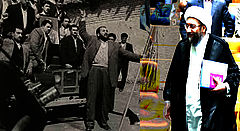The Stage is Now Set for a Coup and US Influence in Iran
» Larijani: They Cannot Repeat the 1953 Coup
Following US President Barack Obama’s comments last week about the need for change in Iran’s behavior and leadership after the July Vienna nuclear deal, the head of Iran’s judiciary and a number of commanders of the IRGC (Revolutionary Guards), including hardline outlets, have issued warnings about the possible return of US influence in the Islamic republic of Iran and stressed that there would be no change in the policies and behavior of Iranian officials towards the US.
In this light, the head of the country’s judiciary Sadegh Larijani told a group of judiciary officials, “The idea and notion of creating gradual change in favor of the US in Iran or that people and officials in our country would retreat from their pure Islamic values is a void thought. In this country and under the leadership of the supreme leader and his enemy-identification and arrogance-battling, and the ever-present wise Iranians, there is no possibility for their dreams. This is something that clearly emerged during the 2009 sedition.”
He continued, “The Americans need to know that even if the nuclear deal is finally approved the Islamic republic of Iran would not retreat from its ideal principles not would its path of fighting injustice change. All heads of government branches and officials follow the supreme leader and act in accordance with the constitution and the general policies of the regime.”
According to Larijani, the general (high-level) goals of the regime are determined and ordered by the supreme leader and implemented by officials and the three branches of government who must execute them according to article 57 of the constitution which provides for their independence and accountability to the supreme leader.
Larijani stressed that Americans could not repeat the 1953 coup in Iran, even a soft version, and said, “The dreams of the enemies in softening the people’s attitude towards fighting oppression or resistance are void. The American nature of interference has continuously existed but the recent verbalizing of it after the deal and interfering in Iran’s domestic affairs is noteworthy and unfortunate.”
Speaking to Jake Horowitz of Mic website last week President Obama had said that change had to come in Iran, even if it was gradual. He spoke of the need for a shift “in politics and leadership” in Iran; in its approach to the world and the US.
In addition to Larijani, a number of IRGC commanders also responded by talking about possible US influence in Iran after the nuclear deal and while criticizing Hassan Rouhani warned him to prevent this. For example General Hamid-Reza Moghadamfar (a former IRGC deputy who was recently appointed to head the propaganda machinery of ayatollah Khamenei – Setad Nashr va Tablighaname ) told a group of Basij para-military volunteers that what was more important than the Vienna nuclear deal was that the Americans were planning to create influence inside Iran, something the Iranian youth had to be careful about. He specifically named McDonald’s as an undesirable outlet in Iran.
Another former IRGC commander Mohammad Hossein Safar Herandi also spoke against possible US influence and indirectly mocked Rouhani.
The head of the Markaze Sisasi Jamiate Motalefe Islami (Islamic Coalition Political Center) group posted a story on Tasnim news agency – belonging to the IRGC – in which it said Iran would continue to supports its friends in the region and the world after the nuclear deal and it would “Neutralize schemes to break up the Islamic world.” It wrote the US was planning to gain influence inside the institutions of the Islamic republic after the deal and called on people to be vigilant.


